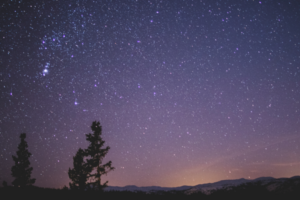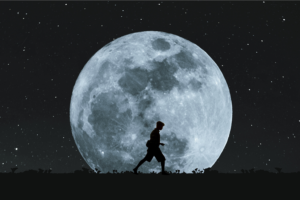Can You Leave A Telescope Outside? 5-Minute Read
Disclosure: This post contains affiliate links and I may earn a small commission (at no extra cost to you) if you click through and make a purchase. Thanks in advance – I really appreciate it!
I have been using telescopes for stargazing since I was 6 years old and one thing that I have learned about telescopes is that – nothing affects their life span more than how and where you store it when you’re not using it.
Although ideally, you should keep your telescope at or near the temperature outside, which will reduce the cooling (or warming) time required when you set up at night.
Key Takeaways:
Can you leave a telescope outside?
Leaving a telescope outside will expose it to elements such as the dew, humidity, air pollution, insects, and dust. None of these elements are good for a telescope as dust, air pollution and bugs may scratch the surface of the lens or mirrors, whereas humidity and dew may rust telescope parts.
So most experienced astronomers (including me) will definitely advise against leaving your telescope outside.
When you’re not using your telescope, it’s best to keep it in a dry and dust-free location away from direct sunlight and where ambient temperatures fluctuate little.
Why You Shouldn’t Leave Your Telescope Outside
Even though telescopes may require little care when compared to other objects, neglect and abuse can have a huge impact on whether you will have a long-term relationship with your telescope or you will need to go to the store next week to buy a new one.
There are so many reasons why leaving your telescope outside at all times probably won’t do your equipment much good.
Although it may seem convenient and time-saving to leave your telescope outside. But leaving your telescope exposed to the elements will see nature wreak havoc upon it. It will likely get ruined.
Here’s a list of nature’s elements that your telescope may have to endure while it’s left outside.
- Direct sunlight
- Rain
- Strong winds
- Dew formation
- Temperature changes
- Air pollution
- Insects, bugs & animals
- Risk of it being stolen
Even if you put the dust caps on and cover your telescope, if any of these negative elements do occur (which they most certainly would for most) your telescope could receive various forms of damage from the mounts electrical components breaking down, rust forming on the metal elements of your device, your lenses fogging up, damage to the coating on the lenses and so on.
Direct sunlight and moisture problems are at least two of the issues you’ll face with leaving your telescope outside in the elements.
If it doesn’t rain or collect morning dew, a change in overnight temperatures outside will mean condensation and subsequently, moisture collecting in your instrument.
Heat, from direct sunlight, is another factor that can harm the lenses.
Dust and other forms of debris blown into the OTA may end up scratching the lens or mirrors inside the tube.
If you’re planning to leave a telescope somewhere for the short term, make sure it’s a dry, secure, and dust-free space that is large enough to get it in and out without an issue.
I would highly recommend keeping your telescope in places that are close to the outside temperature, which reduces their cooling and warming time.
When Can You Leave A Telescope Outside
Although it may be convenient and can be done, I will not recommend leaving your telescope outside.
However, if you’re adamant in wanting to keep it outside, there isn’t a right answer, as it is dependent on your individual scenario and setup.
So whether you can, or would even want to, leave your telescope outside will be a call that you will personally have to make.
Here are some of the factors you may want to consider in order to decide if you should leave your telescope outside.
- Size & weight of your telescope
- Amount of time it takes to set it up
- Accessibility to a convenient storage space
- Weather condition (hot/cold)
- Current season (Rainy/winter/summer)
- Durability of your telescope components
After you have reviewed the above factors, you will be better prepared to decide whether you should leave your telescope outside or not.
For example, if you live in a place with moderate and stable temperature, with minimal rainfall or dew formation, and your telescope is built with good quality materials, then maybe it’s OK to leave your telescope outside for the short term.
However, at the other extreme, leaving it outside long term may not be the best idea.
Similarly, if you have access to a dry, dust-free storage space available nearby, and if your telescope isn’t that heavy and it doesn’t take too long to set it up, then it makes sense to just put in some effort and move your telescope to a safe and secured place somewhere inside with an ambient temperature, rather than leaving it outside among the nature’s elements.
If your telescope is on the heavier side, then it may be harder to move it, to the point where moving it inside regularly may not be practical.
Not only do heavy telescopes present a physical challenge but you also risk knocking it off collimation.
If it takes too long to set up your telescope for stargazing, the best option may be to leave it in a shed or even create a miniature observatory to minimize the setting up process and get to action far quicker and with a lot less work.
How To Leave Your Telescope Outside
It depends much on your climate and perhaps the type of telescope you have to some extent.
You’ll also want to think about your local and current climate and season. If you live in a place with fog, and high winds, or extreme hot/cold temperatures, then leaving your telescope outside may not be a good idea.
If you live in a humid area with rain and higher humidity, you risk damage to the lenses or mirrors. I stored a reflector in a shed once in my high rainfall climate and later found the mirror had acquired some damage from what I think was a fungus.
If you live in a dry place, then there shouldn’t be any issues.
But I would be concerned about water condensing on the inside of a plastic cover and causing problems. A weatherproof cover with ventilation would be ideal.
Do not use a plastic bag, or plastic tarp though. Condensation will build up inside and may produce mold, or mildew on the optics.
Use something that is breathable, yet water-resistant.
If there is dew or condensation, use a low-wattage hair-dryer to gently heat things up just enough for the water to evaporate.
If it’s sunny and hot, consider a cover with a reflective coating.
Make sure all lenses, mirrors, and tubes are tightly covered, as spiders and other bugs can and will find their way in! Even the bottom of a reflector should be covered.
If at all possible, store the mount outside and keep the telescope inside.
One of the best things that you can do if you intend to leave your telescope outside is to get a strong, durable, and resilient Telescope Cover.
I personally use the Orion Scope Cloak because it is made from heavy-duty reflective, tear-resistant fabric and has a waterproof lining. It holds firmly in place, even in high winds, and is resilient against heavy rain.
- Scope Cloak protects your telescope when its idle, shielding it from the elements
- Between viewing sessions, Scope Cloak will keep your instrument clean and dry
- The Orion Scope Cloak is made from heavy-duty reflective, tear-resistant fabric with a waterproof lining
Prices pulled from the Amazon Product Advertising API on:
Product prices and availability are accurate as of the date/time indicated and are subject to change. Any price and availability information displayed on [relevant Amazon Site(s), as applicable] at the time of purchase will apply to the purchase of this product.
Can You Keep A Telescope In A Shed
Yes, a shed or a garage is a good spot to store your telescope when you aren’t using it. Just make sure it is insulated against dampness and excessive heat,
Dust and mold settling on or in your instrument can play havoc with the glass surface and mechanism of eyepieces and the reflective surface of primary and secondary mirrors or lenses.
A wooden shed is great for storing your telescope, as metal or vinyl-based sheds tend to trap more heat which may damage your telescope.
Also, it is important to vent the equipment outside so the air can circulate without an issue.
Make sure that the lenses are protected with dust caps all the time. Refracting telescopes use multicoated lenses, and getting a scratch on the surface of the lens can ruin your refractor telescope.
Ensure that your telescope is never stored in a hot shed. In the reflecting telescopes, the heat can damage the surfaces of the mirrors, and for the refracting telescope, heat can weaken the glue in the compound lenses.
So keep an eye on it in summer and monitor the temperatures. If they got very high, try to find another place to store the telescope.
You must also be careful of mice and spiders. You have to be sure that the telescope is covered correctly or in a secure storage case. You don’t want to have cobwebs inside the telescope or cables damaged by the mice.
One of the easiest safeguards is covering the scope with a sheet or a scope coat followed by something waterproof to keep the moisture out.
This is especially important if you keep it fully assembled between observing sessions, rather than returning it to a storage case.
Make sure you also replace all scope covers and caps, as they will keep the optics and insides free from moisture and dust.
All things considered, a dry indoor cupboard is the best location to store your telescope. You’ll still need to cover your scope with a sheet and put on the caps, but the atmosphere is not as corrosive as anywhere else.
Conclusion
Protecting your telescope from nature’s elements such as dew, rain, pets, and people, and changes in temperatures will ensure that your telescope lasts as long as your life and maybe even longer.
So if you are not entirely sure if it will be safe and best for its longevity, its always best to bring it inside
Unless you have a backyard observatory, never leave your telescope outside, even if you use dust cups or telescope cover. The weather and temperature change can damage the optics.
Even if it is not raining, the moisture, fog, or morning dew can ruin your telescope. The rust can develop on metal parts of the telescope as well.
Telescopes are expensive and delicate instruments, so keep them always in a safe storage place or storage case. Don’t be lazy and keep them inside.
Written by:

Kavya Joshi
My love affair with space began in a field in India at the age of 7, when I looked up at the Milky Way for the first time. Ever since, I have been attempting to cram in every fact about the Universe, I can find into my head.
ABOUT US
We are a team of active amateur astronomers, here to help you with all your astronomy and science related needs – this is anything, from reviewing the latest telescopes to be released to talking about gravity and neurons. The Big Bang Optics was started because of our love for astronomy and to help others like us find the best telescope and accessories.
LEGAL DISCLAIMER
The Big Bang Optics is a participant in the Amazon Services LLC Associates Program, an affiliate advertising program designed to provide a means for sites to earn advertising fees by advertising and linking to Amazon.com. The Big Bang Optics also participates in affiliate programs with Clickbank and other sites. The Big Bang Optics is compensated for referring traffic and business to these companies.





